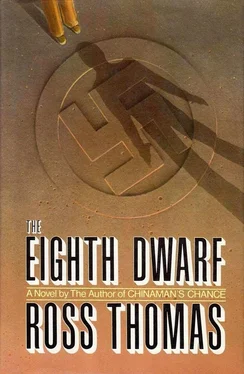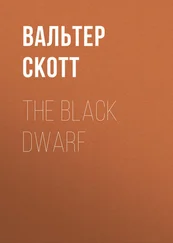“No milk, just sugar,” the middle-aged woman said, put the two cups down with a rattle, and went away.
Bodden leaned over his cup and inhaled deeply through his nose. “Damned if it isn’t real coffee.”
Eva watched as he took his first sip. “What instructions did Berlin give you?”
“Simple ones. Too simple, probably. I’m to find him, to isolate him, and to wait.”
“For further instructions.”
“From whom?”
Bodden stared at her for a moment and then grinned. “From you.”
Eva returned his gaze for several seconds, then dropped it, picked up her cup, and gave her full attention to it.
“You seem surprised,” Bodden said. “Or maybe puzzled.”
“Perhaps both,” she said.
“There are deep thinkers in Berlin. Very deep. I no longer question their instructions. I did a couple of times and it seemed to hurt their feelings. For example, I came across at Lübeck, in the British Zone. Do you know Lübeck?”
“I was there once long ago.”
“A plesant-enough place. Well, I did not sneak across. No, I came across with a certain amount of fanfare. There was an old man in Lübeck, a printer like myself. Two days before I arrived, his leg was broken by some DP’s. I was promptly given his job on the newspaper. It was not, I’m afraid, a coincidence that the old man’s leg was broken. I paid a call on him once — took him some tobacco, in fact. He was a wise old sort — tremendously well read. A lot of printers are, you know. He even thought it was lucky for the paper that I happened to show up when I did. I didn’t disabuse him of his notion. Then there was my landlady, Frau Schoettle. Her name was Eva too. Well, Frau Schoettle was equally interesting in her own way. She reported regularly on her roomers to a certain British captain. His name was Richards, I believe. It would seem, would it not, unwise for me to take a room at Frau Schoettle’s? But those were my instructions from the deep thinkers in Berlin, the instructions which I no longer question.”
There was another silence as Eva watched Bodden take several sips of his coffee.
“Berlin wanted them to know,” she said. “The British.”
“So it would seem. But the British not only knew I had arrived, they also knew that I was coming, and, thanks to Frau Schoettle, they knew when I left. A yellow-haired man went with me — as far as Hamburg. We somehow lost each other there.”
“What are you telling me, printer?”
“I’m not sure.”
She bit her lower lip — chewed it, actually — for several seconds and said, “How much did Berlin tell you about Kurt Oppenheimer?”
“Very little. He kills people. So far, it would seem that those he killed have needed killing. He killed such people during the war; and now the war is over, he is still doing it. He kills with a certain amount of dispatch and efficiency. I did not ask, but I suppose that Berlin could make use of such a man.”
Eva looked down at her coffee, which was growing cold. “I knew him before the war.”
“Ah.”
“It begins to make sense, does it, printer?”
“A little.”
“Your instructions will come from me, if they do, not because I am well trained and cunning or even clever, but because I knew the Oppenheimers before the war. The sister and I were close friends, very close. I knew him too, of course. In fact, in ’36, when he was twenty-two and I was fifteen, I had a schoolgirl’s thing about him. I thought him very handsome and sophisticated. He thought I was a brat, naturally. I slept with his handkerchief under my pillow for months. I stole it from him. It had his initials on it, K.O.” She smiled then — a sad, winsome sort of smile that spoke of better days. The smile suddenly went away, so quickly that Bodden was almost convinced that it had never appeared. When it comes to smiling, he thought, I’m afraid this one is out of practice.
Looking not at Bodden but at her coffee cup, Eva said, “The sister. Her name is Leah.” She looked up then and made her voice assume a neutral, indifferent tone. “She will arrive in Frankfurt two days from now. She will stay with me. She is coming here to find her brother.”
“Ah,” Bodden said.
“It begins to make even more sense, printer, doesn’t it?”
“In a complicated way.”
Eva reached for another cigarette. “There’s more, which you may as well know. It will provide you with further evidence as to why Berlin chose me not for my beauty or brains, but because of my — well — convenience, I suppose. I have a lover.”
He grinned. “And I am desolate.”
“An American.”
Bodden tapped the pack of Camels. “You’re right: I can’t afford you.”
“A carefully chosen American.”
“Berlin’s choice or yours?”
“Mine first — and then Berlin’s. They approved most heartily. We have much in common, this American of mine and I. First, there is the fact that he is a Jew — an American Jew, but a Jew nonetheless. His name is Meyer. Lieutenant LaFollette Meyer. Do you speak any English?”
“A bit.”
“I call him Folly.”
Bodden smiled. “But not in public.”
“No, in bed. He calls me Sugar.” She shrugged. “He is a nice boy. Not simple, but a bit naive. His army has given him an assignment. In fact, that is how we met. His assignment is to find Kurt Oppenheimer.”
“Well, now.”
“He came to question me because I had known the Oppenheimers. It seemed too good an opportunity to pass up. So after checking with Berlin, I took him as a lover.”
“Does he talk to you about his work?”
“Incessantly. He thinks that we are to be married.”
“Sometime you must tell me what he talks about.”
“I will. But for now all you need to know is that he is no closer to Kurt Oppenheimer than you and I.”
Bodden grunted. “Then he will get no promotion soon.”
“But it is a big army, and they are not the only ones interested. So are the British, which should be no surprise to you.”
“None.”
“The British want to keep him out of Palestine,” she said.
“Ah.”
“What does ‘ah’ mean?”
“Perhaps that the deep thinkers in Berlin would like to see him in Palestine.” He shrugged. “But that is not my concern, of course.”
“Or mine.”
They stared at each other for a very long moment — too long probably, because they recognized in each other something that would perhaps be better unrecognized. But Bodden made himself examine it, if only briefly. This one, he thought, does not have the true faith. No more than you do, printer.
“There is one more thing,” Eva said.
“My simple brain aches from what it has absorbed already.”
“Not so simple, I think. But there is this, and this is the last. I received a letter from Leah Oppenheimer. We have been corresponding by airmail through my Lieutenant’s Army Post Office. It is quicker. In her most recent letter, Leah told me that she and her father have engaged two men to help her find her brother. One of them will be arriving in Frankfurt today. His name is Jackson. Minor Jackson.”
She paused and then finished her cold coffee, apparently not realizing that it was cold. “This evening my American will be at the airport. He will meet an airplane. The man on the airplane that he will meet is Minor Jackson.”
“I see,” Bodden said. “I don’t really, but I thought I should say something. You said the Oppenheimers have engaged two men. Who is the other one?”
“He is a Romanian called Ploscaru. I am also told that he is a dwarf.”
“You said ‘told.’ Did she tell you that?”
“No, printer,” Eva said. “Berlin told me.”
Bodden watched as she shrugged into her fur coat and turned its collar up around her chin. Her fingers stroked the fur as though its touch and feel were somehow reassuring. This one still likes a little luxury, he thought. Well, who could blame her? Certainly not you, printer, who always found the Spartans just a bit stupid.
Читать дальше












